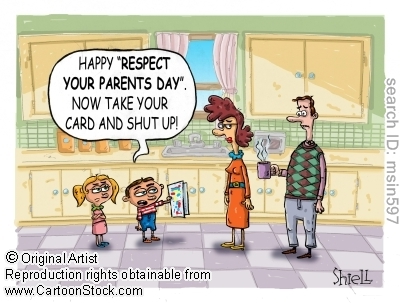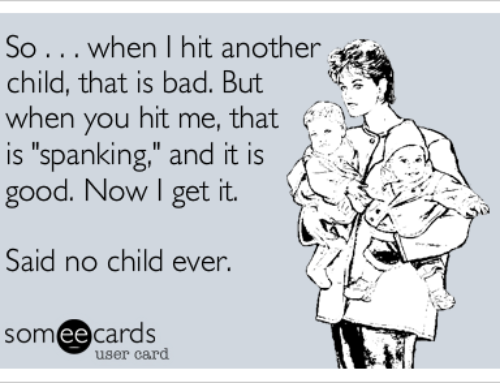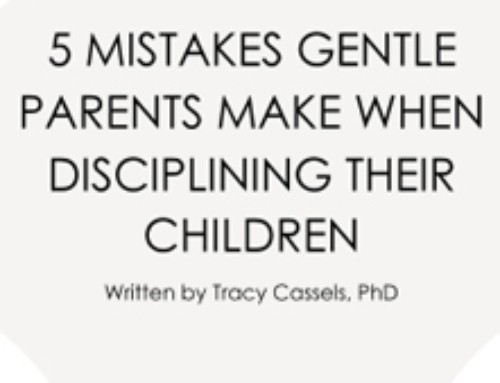Handling Tantrums the Attached Way
I couldn’t think of a better subheading (creativity is not my strong point), so by no means do I believe that all attached parents approach tantrums the way I do. I just had to get that out there. I’m speaking generally here and this will be no means define all attached parents, but the fact is that attachment parenting does not mean you allow your child to have a full-on fit in the middle of the grocery store with no intervention, claiming the child is just “expressing herself”. That is, once again, permissive parenting.
First, let’s be honest though and admit that the child really is expressing herself or himself, it’s just that the form the expression has taken is not socially appropriate and not really helpful to the child either. That said, attached parents do intervene, we just don’t intervene in a harsh and authoritarian manner. I’ve personally found that the people who believe that I must let my child run rampant are the ones who usually use force when dealing with a “misbehaving” child (quotations because there is so much more than just “misbehaviour” going on in the vast majority of cases). If their child is having a fit in the grocery store, they firmly believe the way to handle it is to grab their child by the arm and take them out of the store immediately so as to teach them in no uncertain terms that that type of behaviour won’t be tolerated. In turn, these people tend to believe that if you don’t behave in that same way, your child will continue to throw fits and be unruly little brats.
That authoritarian type of behaviour will get a child to stop having any kind of fit (it’s true), but it also has some rather undesirable (in my opinion) repercussions. Perhaps most logically, harsh discipline (including harsh scolding, spanking, or slapping, as they are distinct from childhood abuse in a research and legal sense) is linked with later aggressive behaviour in children
So what do attached parents do that’s different if they don’t let their kids run wild?
I’ll give you an example using my own daughter, again with the reminder that each parent will do something that works for their child—the joy of being attuned to your child is knowing what works with them and what doesn’t. My daughter has had one meltdown in a public place when she was trying to tell me something and I simply couldn’t understand what she was asking for. I sat down next to her and explained that I understood she was frustrated. I then told her that screaming like this is not how we fix things, but that I would let her continue for 10 more seconds. After 10 seconds, we’d stop, hug, and figure out how to fix it. And then I started counting – calmly, not threateningly (I should add here that counting has calmed my daughter since she was only a few months old – don’t know why, but we can just count up to over 100 and she just calmly sits there listening, happily and it’s never used in a threatening manner – no “countdowns” so to speak). She stopped her “fit” before ten seconds, but I counted to 10 anyway. We hugged, then we continued shopping, with her getting a cart to pull around, which is what she had wanted, but been unable to communicate with me.
What did these steps accomplish? For me, it’s utterly important that my daughter know I understand how she feels and that it’s okay to feel that way, we just need to find alternate ways to express it or solve the problem. However, I still let her have her 10 seconds because I think we all need 10 seconds sometimes. Heck, I have moments where I go to the kitchen or another room just to curse for 30 seconds to get it out of my system. I also believe that giving her the opportunity to stop her tantrum herself is empowering to her – she ended it, I didn’t scare or force her into stopping. Finally, I firmly believe in the hug because I want my daughter to know I always love her, especially when she’s feeling low.
The funny thing is though, although I’m pretty sure some would scoff at my way, I think it was easier. Yes, people in the store had to listen to ten more seconds, and perhaps some kids wouldn’t stop at that point. But I do believe most would when their feelings have been validated and they’re given the opportunity to fix things for themselves. In a world where people promote forcing our kids to “self-soothe” by leaving them to scream, I prefer to focus on teaching my daughter how to handle her emotions herself, just with a bit of guidance. And in turn, you won’t see my daughter being the one who’s either silent, but clearly unhappy, or screaming blue murder with no one to help out.
Not Everything They Do Is “Great”
I have first-hand experience witnessing the effects of excessive praise for a child. You know, the kind where the parent says anything and everything the child does is “perfect” and I can tell you that these were not attachment parents. They were, however, permissive parents in all facets of the job. I’ve seen these children believe they are the best at everything—even when they clearly are not—and declare anyone who says otherwise to be “mean”. Unfortunately, these kids eventually have to face reality when they see other kids beat them in races, score better on tests, sing better, play games better, etc. Most of the time the way in which they handle this newfound news is awful. They have fits when they don’t win, they quit before there’s even a chance that they’ll lose, they say the other kids are cheating, and it goes on. But worst of all, they refuse to try harder to improve which means they never get out of the awful cycle they’re in.
Some might say that’s just my experience, but there is research to support how dangerous it is to offer unlimited praise for a child’s ability. Claudia Mueller and Carol Dweck from Columbia University examined the effects of praise for ability—in this case, intelligence—versus praise for effort in fifth-grade children. What they found was that children who were praised for their intelligence instead of their effort were more likely to rate performance as more important than learning, were more likely to believe failure was due to their innate ability (not being smart enough) instead of simply not trying hard enough, were less likely to persist upon a first failure, and reported less enjoyment of the tasks at hand. Furthermore, when multiple problems were given, children who received praise for their effort completed significantly more problems after failing than those children who received praise for their intelligence, despite the groups being comparable when no failure was experienced (suggesting innate ability was actually equal).[5]
What can we take from this?
First, perhaps I should have first made the caveat that not all types of praise are equal. You can safely praise your child all the time, providing you’re praising the work, not the outcome. Consistently telling a child he’s smart will simply lead him to believe that he doesn’t need to work like others and will end up with quite a shock when a bit of work ends up being necessary and the work habits haven’t been instilled. You can however praise your child for working hard and trying their best – in fact, it’s good for them. The child who receives that type of praise will want to work hard at whatever it is she decides to do. Furthermore, if the praise isn’t dependent on getting an A or finishing first, their sense of self-worth and self-esteem won’t be negatively affected if the outcome isn’t the way one might hope. I can’t help but reflect that our society is so caught up on our children’s self-esteem and yet we do it a disservice by placing the emphasis on outcomes instead of effort. As the research shows (and has been supported by other work by Carol Dweck), children who only receive praise for their ability have the unintended consequence of having lower self-esteem when they face failure (which we all inevitably do) because they’ve been led to believe they don’t need to do work, that it’s all a matter of something intrinsic to us.
In fact, it seems the crux of the debate around praise centres on self-esteem. Those who have decided to praise their children for everything they do, do so not out of trying to screw up their kids, but out of the belief that offering this praise will increase their self-worth which will help them in the long term. Those against offering praise for every little act tend to feel this way because they believe that offering constant praise does not help a child succeed in this world as it removes the impetus for them to work hard to succeed.
What I hope the research shows though is that neither position is fully right or fully wrong. As I mentioned, different types of praise have different outcomes, and one can offer a lot of praise when it comes to working hard without negative ramifications (in fact, it tends to promote the positive act of continuing to work hard). Importantly, this doesn’t mean you have to lie and say that a D is a good grade – far from it – but you can tell your child that you’re proud they did their best and that if they keep working it can get better. Because if a child is willing to work, then they will get better and may even surpass many of the kids who have natural talent but don’t bother with any of the extra work. It also means that if they didn’t do their best and got a D, there shouldn’t be any praise. You can’t celebrate every little thing your child does because that teaches them the wrong lessons. But equally bad is only celebrating “wins” in the sense of successes (e.g., getting an A on a test). It seems to me that the middle ground that offers the best results for kids is to focus on the work they do instead of the outcomes they achieve. After all, if they continue to put in the work, the outcomes will follow. It may not be immediately, but I’ve never met someone who was willing to work harder than everyone else who didn’t succeed.
To Finish Up…
I think one of the worst things that has happened to the Attachment Parenting movement is that early on, in the late 60s/early 70s, a bunch of parents decided to misinterpret the type of parenting promoted by John Bowlby and Mary Ainsworth[6][7] as being supportive of permissive parenting. It means that our society has seen many children grow to be rather dysfunctional adults and use this as the reason to eschew Attachment Parenting. But these kids were never parented in an attachment or evolutionary manner and so the rest of us, who are actually utilizing the parenting tools we’ve evolved to use, get the bad rap for it.
Parents across history have had the intuitive knowledge to know that their children need limits and boundaries. They also have learned to pass on cultural information in appropriate ways while not diminishing other parts of their children’s development (see [8] for a review). At a societal level, we’ve lost this intuition in both directions—we have far harsher parenting than we should as well as far more lenient parenting than we should. But because the harsher parenting seems to create outcomes more in line with our expectations about children, it’s more readily accepted, especially in contrast to the permissive parenting being thrown around as Attachment Parenting. And yet neither type of parenting allows a child to truly fulfill his or her potential.
Parents who practice attachment or evolutionary parenting aren’t aiming to have their kids turn out “fine”. They are the ones who want to see their kids thrive. And not just thrive in the work force, but thrive as human beings who care about the other 6 billion (and counting) human beings on this earth. In turn they do what they believe and what research has shown will allow children to excel, namely respond to their distress, place limits and boundaries where appropriate, accept and acknowledge their emotions (especially in times of distress), promote working hard over praising either an outcome or simply showing up, and learning how to truly regulate emotions in order to handle unwelcome or unfortunate situations. Our children may not be the ones who will step on anyone in their way—in fact, we don’t want them to be—but they are also not the whiny little brats people mistakenly think they are. By and large, they turn out to be the loving, empathic, creative, self-aware, independent, and confident kids and adults we hope for. I have to wonder – who would have a problem with that?
[1] Weiss B, Dodge KA, Bates JE, Pettit GS. Some consequences of early harsh discipline: child aggression and a maladaptive social information processing style. Child Development 1992; 63: 1321-35.
[2] Bender HL, et al. Use of harsh physical discipline and developmental outcomes in adolescence. Development and Psychopathology 2007; 19: 227-242.
[3] Smith JR, Brooks-Gunn J. Correlates and consequences of harsh discipline for young children. Archives of Pediatrics and Adolescent Medicine 1997; 151: 777-786.
[4] Baumrind D, Larzelere RE, Cowan PA. Ordinary physical punishment: is it harmful? Comment on Gershoff (2002). Psychological Bulletin 2002; 128: 580-589.
[5] Mueller CM, Dweck CS. Praise for intelligence can undermine children’s motivation and performance. Journal of Personality and Social Psychology 1998; 75: 33-52.
[6] Bowlby J. Maternal care and mental health. World Health Organization 1951.
[7] Ainsworth MDS. The development of infant-mother attachment. In BM Caldwell & HN Ricciutti (Eds.), Review of child development research (Volume 3, pp 1-94); Chicago: University of Chicago Press. (1973)
[8] Grusec JE & Davidov M. Integrating different perspectives on socialization theory and research: A domain-specific approach. Child Development 2010; 81: 687-709.
—–
The following link will take you to your local Amazon:







I managed to miss that pic on fb, bummer. I had my (quite a bit younger) nurseling the last time I went to the eye doctors and he was great about it.
I’ll send it to you – it caused quite the stir!!!
I love this article. Now, I have a 15 month old. How do I do it?
What are you trying to do??? 😉
I want to see the picture too! Proud of you, momma 🙂
I’ll edit part 1 and add it. Check back in ten mins or so 🙂
So what the child in this scenario learned was that bad behavior gets her what she wants. I’m not a fan of rewarding for tantrums, but you can’t deny that the empirical evidence supports it – children repeat what works. If a melt down will get her what she wants, she’ll continue to melt down.
Yes, if giving in the tantrum is what ended it, that would be learned. But if learning to regulate emotions and problem-solve gets you what you want, then that’s the route you take. I can tell you that we don’t have tantrum problems with our girl at all. She’s responsive to talking things out when she gets upset and we find solutions we can all live with. She’s learned compromise and accepting that she won’t always get what she wants. It’s wrong to think that just because a melt down occurs that that becomes the trigger to repeat. It’s how it ends.
I think in the way you solved that tantrum or meltdown you have confused the “needs” and wants” of your child like you self explained in the first part of the article.
“We hugged, then we continued shopping, with her getting a cart to pull around, which is what she had wanted.”
She made a tantrum because she wanted to pull a cart. And exactly that, is what the child will learn. “that bad behavior gets her what she wants”…
Except you ignore that she couldn’t communicate well – the tantrum was her frustration at her inability to articulate her thoughts. And that I am aware of. I don’t need to punish her for that. Her tantrum wasn’t that I denied her something she wanted – she’s had to deal with that many times since and though she does get upset sometimes, she knows it doesn’t waver. And this is the problem with that mentality – you’re punishing for the wrong reasons. You don’t look to the cause of the tantrum, which in this case was a failure to be able to communicate, and so only see the “bad behaviour” to “get what I want” link.
Do you know what my daughter has learned from episodes like this? She has learned that I will get down and work to understand her when I can’t right away. This has stopped immediate frustration for her and so no more communication-issue tantrums. If I had said no cart because she got upset at not being understood, what kind of lesson is that? She’s only thinking of trying to be understood and I punish her for that? She’s not learning a “tantrum doesn’t get me what I want” but rather learning that she’s helpless to communicate her needs and I’m going to punish her for that. Not the kind of parenting I’d like to see.
I’ve always believed that the correct way to handle tantrums was to ignore them, but I’m starting to reconsider. I think this change of heart has been partly instinctual since having my first baby – the things that I previously would have thought of as too permissive actually feel absolutely right, but I do still feel the need to look at the literature. As I read, I’m realising that I am naturally gravitating towards attachment parenting (in the true sense). What I do still struggle with, however (probably because I haven’t actually been confronted with it yet as my son is too young), is imagining how attached parents would deal with a complete, screaming, foot-stomping kind of melt-down. The kind where you can say whatever you like, as gently as you like, but the child is too far gone to actually listen. In that situation, how could your approach of “in ten secs we will do this” work? Would you simply sit and wait until the child had calmed down enough by themselves to listen, or would you do something else? I guess I am afraid that once a big tantrum comes I will have an idea in my mind of how I want to handle it, but the approach won’t work in practice and I’ll panic!
You just have to remember that tantrums are still a way for a child to communicate. I would recommend reading ToddlerCalm by Sarah Ockwell-Smith before you get to that stage as she talks about tantrums and it’s amazing information for parents. 🙂
I breastfed my children for 8 months, 4 years and almost 5 years.. the one I fed till almost 5 and I had to forcibly end it for school,, she ended up the most independent one of all moving out of home at 14 to other parent, and then at 16 detached from both parents.., the 8 month fed child is my most clingy… and she is an adult now..
I have a lot to learn being a mom of a 15 month old. It is so different having my own child after 14 years of teaching Early Childhood, in Grades PK, K, and 1st.